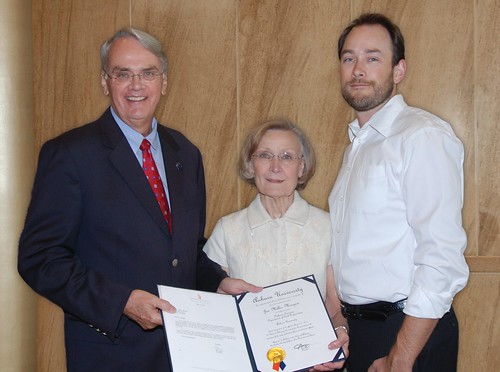
Joe Morgan—who arrived on the Auburn campus Sept. 1, 1971 as an assistant professor of civil engineering — retired on August 31 as associate dean of academics in the College of Engineering, a position he has held for the past decade. Now professor and chair of the Department of Civil and Environmental Engineering at Lipscomb University in Nashville, Morgan plans to continue in both teaching and administrative roles for the next few years. Auburn’s home football schedule will bring him back to the plains on a regular basis this fall, and he says, for a more permanent retirement after he sees his current duties at Lipscomb — nurturing and strengthening its new civil engineering program — come to fruition. At Auburn, he was the dean’s quiet partner in the pursuit of academic excellence, and a teacher of hundreds, if not thousands, of civil engineering students.
JK: You were a faculty member 40 years to the day – arriving in 1971 and leaving in 2011 – so tell us first, what brought you to Auburn?
JM: I came here straight out of grad school. I sent a letter and my résumé to Auburn, which was still in the mail when Paul King, my professor, received a call from Joe Judkins, who was in charge of faculty recruitment in civil. When I came on campus in February to interview, it was 20 degrees and sunny, but everybody was complaining about it. Having spent the past five years in Blacksburg [Virginia], I thought it was just short of wonderful. The first graduate-level class I taught at Auburn was in stream sanitation, now known more generally as surface water quality modeling, and Dean Benefield was one of my students.
JK: You have taught a lot of students throughout the years, but at the same time, wasn’t your move into administration a defining part of your career?
JM: I began what you could call a gradual move into administration in the mid to late ’80s when I became assistant department head in civil. When Larry Benefield became interim dean he asked me to replace him as associate dean for academics, which I did on a shared basis with Vic Nelson in electrical. I wanted to honor a commitment to Dr. Judkins, who was then civil’s department head, however, he let me assume that position [associate dean for academics] on a full-time basis when Dr. Benefield became dean in 2000.
JK: How has civil engineering changed, in terms of teaching?
JM: In a sense, it hasn’t . . . the fundamental principles remain the same. At the same time, the technology has changed immensely, and new knowledge has had an incremental but profound influence on the field, not only in water quality and wastewater management — where my expertise is concentrated — but across civil engineering as a whole. Environmental engineers know the science now so much better, particularly as it relates to biochemistry, to use a broad example, or membrane technology, to be more specific. The students have changed too. When I first came, the typical Auburn student was a hard-working kid who was probably the first in the family to attend college. They had fun, too, at school, but the attitude was a little different because they did not often come from a background of privilege.
JK: What, then, characterizes today’s students?
JM: There have been significant changes, for sure. Our students now come in with higher test scores, better high school GPAs, and much better overall preparation than the ones that came in a generation before. At the same time, they may be a bit less independent than those who preceded them, which may seem surprising. As a parent myself, I sometimes ask myself if this is a result of changing family norms over the years, but I don’t really know. I am concerned that it has an effect, even if indirect, on the drive to excel in the current generation of students that we are seeing.
JK: Have faculty expectations changed since you began teaching?
JM: That would be hard to answer without asking the faculty, one by one. I can say that the expectations of what our faculty should be has changed. There is more emphasis on research now, and that’s in no small part because of the career implications that are there, beyond the pure advancement of the field. The day is gone when your reputation was more localized, and dependent on your reputation among your students. We live in a more global society now, and expectations have become more global as well.
JK: How does it feel to leave Auburn?
JM: This may sound trite, but I really believe that Auburn does have a real family attitude — that there is such a thing as an Auburn man, and an Auburn attitude that no other school has. I have seen this in practice time and again, when just finding out that you’re from Auburn . . . is enough, and that it is all you need to know. This kind of feeling may exist elsewhere, but it’s not as strong. Being away from Auburn makes you appreciate this even more, so I may be putting myself in the position, once more, of being reminded about just that. Obviously, I have had the opportunity in the course of four decades to build some real friendships, ones that I know I am going to miss. I am hugely respectful of friendships with Dean Benefield, as well as civil department heads Joe Judkins, Ed Ramey and Rex Rainer, all of whom have been incredible colleagues and incredible friends.